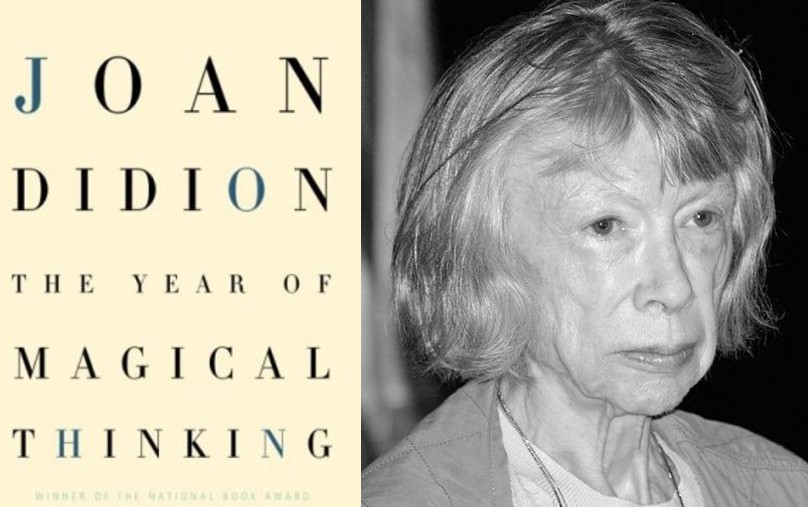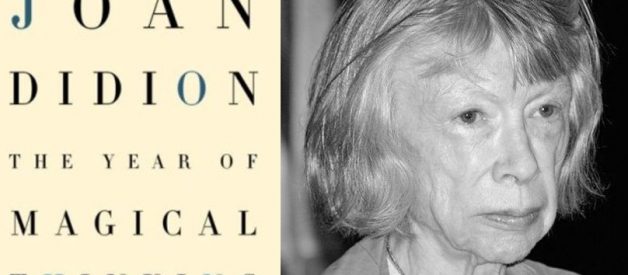 Wikimedia Commons
Wikimedia Commons
Joan Didion wrote The Year of Magical Thinking in 88 days. The book chronicles the first year after the death of Ms. Didion?s husband, John Gregory Dunne. The couple had been married for 39 years when Dunne had a massive heart attack at the dinner table as Didion was mixing the salad.
The Year of Magical Thinking won the National Book Award in 2005 and was also a finalist for the Pulitzer Prize.
I am, admittedly, more than a little late to the party when it comes to reviewing this book or, for that matter, reading anything by Joan Didion. In 2005, the year it was published, my own family was shiny and new. I?d been married 7 years and my daughters were 1 and 4 years old.
I could not fathom the kind of loss Ms. Didion had experienced???the sudden absence of her husband after nearly forty years of marriage. She would lose her 39-year-old daughter, and only child, just 19 months after her husband.
Someone sent me the book after reading a particularly dismal essay I?d written in mid-August, when I was in the midst of an inexplicable surge of grief and depression. I settled in to read it without really understanding that Didion?s year of magical thinking would soon be followed by the catastrophic loss of her only child.
I?m not sure why that matterstome. Maybe because once I knew, I felt a kind of nagging dread everytime I picked up the book. I think it touched some deep fear I have of losing someone else I love. Didion lost both her people in under two years and if it can happen to her, it can happen to me.
I?d never read anything by Joan Didion before reading this book. I think it?s important to clarify that before getting into the weeds of the review because Joan Didion is such an iconic literary figure.
Thus, without any previous knowledge of Didion?s writing style, I assumed I?d be reading a standard grief memoir, but The Year of Magical Thinking is more than memoir. It?s a chronicle of a uniquely awful moment in Didion?s life and the months immediately following that moment. It?s grief, frozen in amber.
Didion?s book carries us into the darkest moments of her despair, enabling the reader to experience her grief in real time. Her writing beautifully reflects the fragmented, nonlinear thoughts of a grieving mind. I recognized this at once and felt my own grieving soul sigh in recognition as if to say, ?Ah, I get it. A fellow traveler on this lonely path.?
The book opens on the day of her husband?s death. Didion and Dunne had returned home from visiting their adult daughter, Quintana, at the hospital. Quintana was in the ICU with septic shock, a complication of the flu. She?d been in a medically induced coma for a week and at that point they weren?t sure if she would survive (She did survive the sepsis, but Quintana died nearly two years later from pancreatitis).
Dunne died mid-sentence at the dinner table. When he stopped speaking, Didion looked up to find him slouched over his plate. The ordinary setting???a married couple at the dinner table???is shattered by this catastrophic event which was obviously (and understandably) deeply traumatic for Didion. She?ll come back to this moment again and again throughout the book, replaying her husband?s final moments, his final days, and his final weeksinhermind.
Didion writes, ?This is my attempt to make sense of the period that followed, weeks and then months that cut loose any fixed idea I had ever had about death, about illness, about probability and luck, about good fortune and bad, about marriage and children and memory, about grief, about the ways in which people do and do not deal with the fact that life ends, about the shallowness of sanity, about life itself.?
The Year of Magical Thinking jumps forwards and backwards in time, lingering on cherished memories of Didion?s life with her husband before veering abruptly back to the present, to a life she doesn?t yet fully grasp.
She relentlessly reflects on the act of mourning itself, analyzing and examining it like an investigative journalist might look at a particularly puzzling conundrum. As I read the book, I often found myself wondering if she was more journalist than essayist (this inspired me to want to read more of her work ? I?ve already borrowed Slouching Towards Bethlehem from the library.)
What was clear to me is likely clear to anyone who has lost someone incredibly dear to them, Didion was trying to understand grief???that is, the kind of grief that causes the world, as you know it, come to a sudden, inexplicable end.
?Grief turns out to be a place none of us know until we reach it,? writes Didion.
There is no way that I could?ve truly grasped this sentence if I hadn?t lost my daughter. I?d lost people ? a cousin in her twenties, my uncle in his forties, my grandmother (well into her eighties) and I grieved these losses, but none of them took me to the place Didion alludes to in her book. Losing my daughter was my ticket to that place ? a place I?m still existing in and trying to navigate.
The Year of Magical Thinking is a book that grieving people recommend to other grieving people because it goes well beyond our cultural expectations of grief and mourning. This is the story of what happens in the months after the funeral, when everyone has stopped bringing pies and checking in and you are left with the indescribable emptiness of the missing.
Didion writes, ?Nor can we know ahead of the fact (and here lies the heart of the difference between grief as we imagine it and grief as it is) the unending absence that follows, the void, the very opposite of meaning, the relentless succession of moments during which we will confront the experience of meaninglessness itself.?
I?m not very far along on this road of grief???my daughter died two and a half years ago???but it?s long enough for me to have some perspective when reading this book.
It was clear to me that Didion was writing from a place of recent bereavement. It?s a muddled, confusing place filled with perpetual disbelief (the book wasn?t muddled and confusing, but her portrayal of her own state fo mind communicated this.) It?s also a lonely place that offers no chance of solace.
I connected most with Didion?s nostalgia, her musings on what seemed to be the best time in her life. This was when she lived in California with her husband and young daughter, a perfectly happy family of three.
Didion?s longing for a time she may not have fully appreciated really resonated with me. I often think that the fifteen years that I had both my girls with me were the best years of my life. It?s difficult not to dwell on those memories or try to recall them even though it hurts. Didion?s narrative conveys the impossible fragility of family.
I found Didion?s reflections on her own grief comforting. In many ways, I also felt less alone because I recognized so many of her thoughts and their pattern of obsessiveness, the need to pretend that things would go back to normal.
The true power of The Year of Magical Thinking is its camaraderie. Didion takes us with her and allows us to witness her grief. In doing so, we naturally connect our own grief with Didion?s. It?s a sharing of sorrow, and acknowledgment of the need for compassion. That?s why this book is gifted by grieving people to grieving people. It speaks our language. It names our pain and, in doing so, makes our burden a little lighter.


